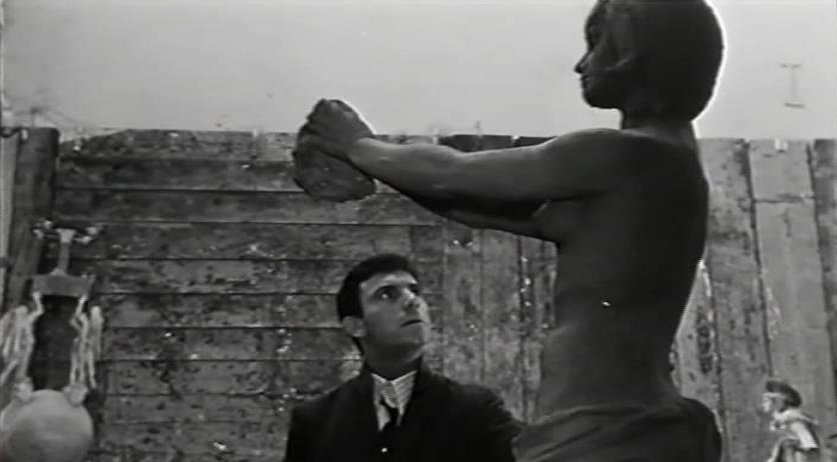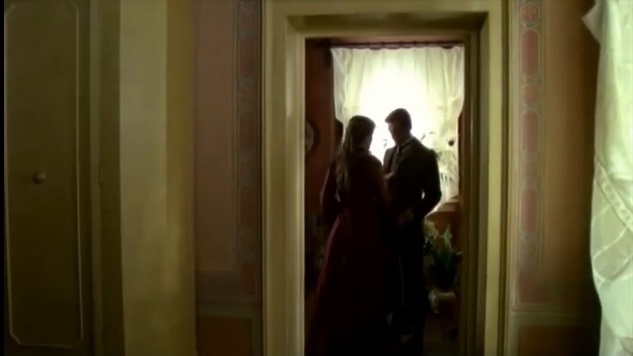La
Viaccia
The love of a
whore.
It has all the
mastery, after all, in a young man’s life.
The particular
incident conveyed is an item in Beckett’s biography, “no’s
knife in yes’s wound.”
Bolognini’s mise en scčne
shows why there is a Seurat and a Picasso, to say
nothing of Toulouse-Lautrec.
“A shameful
waste” (Bosley Crowther, New York Times,
brushing up his Shakespeare).
Senilitą

If knowing is remembering,
an ephebe pushing forty in love is a dodderer. The
labored writer, his sister, a friend full of talents, the elusive beloved.
Trieste, city of
Svevo and Joyce, viewed as per a taste of
honey (dir. Tony Richardson) but through the added perspective of memory,
another character.
Losey has Eva for the ending.
Eleanor Mannikka (All Movie
Guide), “conventional story of unrequited love.”
The one that got
away, as old fishermen say, proverbially.
La Corruzione
The
publisher’s son who wants to be a priest.
A
horrible joke, of course, finely observed, well told, one of the great films of
the cinema.
There’s
a whore in it, and a yacht ride, and mass shit, sc. smash hit (Boulez).
Senso civico
Le Streghe
How a witch
negotiates someone else’s traffic accident and makes her appointment in
record time.
Arabella
The intersecting
stories of two crooks, the simple moral being that if you would cheat the
Government, even under Mussolini, you would rob the Vatican Museum as well.
Bolognini in
English.
Paul Brenner (All Movie Guide),
“apparently...”
Halliwell’s Film Guide, “floppy, tedious”.
Bubł
With reference to
La Viaccia principally, but also La Corruzione and so forth, the case study of a
prostitute, her cry from street to street answered, or not.
Again, as elsewhere
noted, a faultless rendering of the epoch, with Kirchner’s ladies in full
regalia, or anybody’s.
Imputazione di omicidio per un studente

The key is
Zinnemann’s High Noon by way of
Winner’s I’ll Never Forget What’s’is’name in the last scene (cf. Avildsen’s
Joe).
End of the
examining magistrate’s career, if a witness gives false testimony a
charge of perjury is brought at once, if a sympathetic priest lies his
deposition is simply torn up, if the police arrest the wrong man and fabricate
a case whilst withholding evidence one no longer has the support of the People
(the State, the Crown), on one’s own the case must be addressed, not the
polished highly-placed influential Russian espionage agent of McCarey’s My Son John, nor even the top scientist
a defector in Rouse’s The Thief, rather one of the hapless layabouts
of Dassin’s The Rehearsal, with
a bent toward the cadres of Godard’s La
Chinoise or Frankenheimer’s Year of the Gun, student types, one of
them shot dead at a demonstration, another the son of the examining magistrate,
a dead cop, the imputation of the title brought against another student who
speaks of “class justice” and “Fascists”, the examining
magistrate shrugs off the former and contemns the latter notion, cp. Riot on Sunset Strip, dir. Arthur Dreifuss.
Morricone has a
structural part to play, Ruzzolini’s
cinematography finds beauty in realism. Martin Balsam
is dubbed as il giudice.
Libera, amore mio...
Mussolini, who
knows a time is coming...
The
anarchist’s daughter, who wears red to piss off the Fascisti.
The conquest of
Ethiopia. “Fascism is one big family...”
It would have
been better, she says, if il Duce’s papa had
pulled his pud, anarchism to her means calling a
spade a spade. True story, Vincenzoni
tells it.
It’s said
someone scrawled on Belli’s monument a phrase
comparing B.M. to light, “we prefer to be left in the dark” was
added.
Spain for a
democrat she gives refuge, (cf. Rossellini’s
Era notte a
Roma). Lorca on bread and liberty. A
“special tribunal for the defense of the state” pronounces upon
her, the sentence is exile (cf.
Rosi’s Cristo si č fermato a Eboli).
“Italy’s
death sentence,” the bond with Hitler. The war
in Europe. “Beginning of the end.” The war in Russia. She is insupportable, the Fascists close his tailor shop after her
outburst at a newsreel, Luce per il Duce.
Fall of
Mussolini, arrival of the Germans. Arrest order. Life
with the partisans. Reprisals. “Libera, I’ve looked for you so long. I didn’t
know if you were alive or what they’d done to you. I’ve knocked on
hundreds of doors. And all the time you were here in Padua.” End of the
war.
Postwar
accommodations. The gunman on the rooftops (cf. Conway’s Viva Villa!).
Per le antiche scale
The old way, the
best way, the only way, understood as an insane asylum under Mussolini.
This is fully
formed and amply developed, the particular conceit is
finally to understand a nervous breakdown as placing the regimen and the regime
in momentaneous conjunction.
Richard Eder of the New York Times suffered the delusion
that he understood it, “the pace is leaden, the dialogue
ridiculous.” Time Out Film Guide scarcely disabuses him, but finds
what are called redeeming qualities, “it at least shows evidence of an
intelligent awareness” etc.
“Them
well-worn stairs,” as Albee has it.
L’ereditą Ferramonti

Another
“New Italy” in 1880, failed bakery, three worthless children, pimp,
pig and basilisk.
The pig buys a
hardware store and marries the boss’s daughter, a very clever girl. “We’ll sell nails to the Pope, new nails for
every crucifix in Rome!” Flooding is
advantageous to a Tiber river project all three profit richly in. “They
kiss ass,” says the elder Ferramonti,
“instead of working,” in his time a hard master he muzzled the ox,
now he is a moneylender.
A partnership of
pimp and very clever girl to make her “rich and respectable”... the
elder Ferramonti’s dream, all of them bound in
ice... the source of inside information dried up, the business at a standstill,
the Ferramonti inheritance all but delivered... and
if it ends in a memory of Eisenstein’s October, it is to see a rich and respectable member of the
government descend into the depths.
Hal Erickson (All Movie Guide) is notably in error
about the plot, “there’s little more to the story than that,”
he adds confidently.